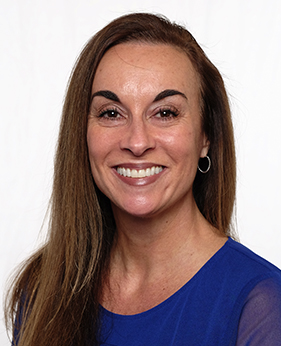
BLOG
—
Celebrating Women’s History: Being a Leader in a Male-Dominated Industry
Young women today have many more options when it comes to choosing a career than I had when I was a child growing up in Miami, Fla. But despite the progress that has been made, some STEM-minded women may still be discouraged from working in a statistically male-dominated industry. As an engineer who was the only woman on my team when Woolpert hired me out of college in 1995, I can tell you that women are not only able to do the job, but we can excel and become a positive, transformative force in the industry.
I am a project manager in the water market at Woolpert, and I am surrounded by women who are succeeding in this field. My colleagues include Crystal Muller, who works in the firm’s Charleston, S.C. office, and Rebecca Coulter and Frances Bryan, who work in our Columbia, S.C. office. Each of these standout water resources engineers are helping guide multimillion-dollar projects across multiple states. In honor of Women’s History Month, I want to illustrate how STEM professions are not just for men by recognizing the work of my colleagues and the work of all the women who are breaking the mold. I also would like to also share my journey into the engineering world.
I Too Had that Strength
Since I was little, I always had interest in math and science. The decision to go into engineering came naturally. Engineering was never presented to me as a “male” industry, and I wasn’t discouraged when I was the only girl in my high school drafting classes. On the contrary, the classes were a lot of fun! Back then we didn’t have sophisticated design software, and everything was done by hand. I decided to focus on the water arena while an undergraduate at North Carolina State University, where I earned bachelor’s degrees in both civil and environmental engineering. Learning how technology can support the built and natural environment energized me.
My parents encouraged me to follow my passions, and my mother has been one of my greatest role models. When I was 16, my father died a month after he was diagnosed with cancer. In the face of such a sudden tragedy, my mother picked up the pieces and kept going. An ER nurse, she started working double shifts at the hospital to make ends meet. Dad didn’t have life insurance, but my mom not only paid the bills and finished raising me and my sister, she put enough money aside to send us both to college. Seeing my mother respond in that way was empowering. I knew that I too had that strength. I too had control over what I chose to do and what challenges I could overcome.
Good Ol’ Boys and Being Respected
I remember early in my career occasionally sitting down with a much older male client. My immediate impression was that he was a “good ol’ boy,” or someone who’d rather be talking to a man. Sometimes that wasn’t due to a gender issue, but to an age difference—but that judgment can feel the same. When you’re 22 years old and talking about a project with a 55-year-old contractor, it’s not unusual to feel insecure in your knowledge and abilities. I learned quickly you must be as prepared as possible for those meetings—in appearance, presentation and in familiarity with the subject matter. Knowledge is power, and with experience your confidence grows. I also learned early in life to put myself in places and around people where I felt respected and supported.
The same advice can apply to your personal life. As a woman, you run into the occasional condescending mechanic or salesman who treats you differently than he would your brother or father. These situations can be stressful, especially when you’re left on the side of the road with a broken-down Mini Cooper and the repair shop owner blames you instead of his employee’s shoddy work. People will treat you the way you allow them to treat you. If you conduct yourself with class and poise, you’ll be treated accordingly. If I need to say something, I speak up for myself, and I remove myself from situations where I’m not respected. Needless to say, that repair shop no longer has my business.
Communicating and Building Relationships
One of the best qualities you can have as a professional is being an effective communicator. In my field and in many others, how you communicate is often a determining factor on whether you get the job or promotion. Engineers aren’t known to be social butterflies, and communication is often a valued skill that we need to develop. Whether it’s being comfortable speaking to a group of strangers, facilitating a meeting or writing a well-crafted proposal or email—delivering clear, consistent communication makes or breaks your days. Having the hard skills and technical knowledge of the tasks at-hand is obviously necessary, but you also need the soft skills to build relationships. I try to make every client I work with feel like they’re my No. 1 client. Consequently, I’ve cultivated and maintained strong relationships over the years. The relationships you build, not only in your personal life but in your chosen profession, are vital to having a rewarding and prosperous life.
Times have changed since I graduated from college and started my career in engineering. I’m no longer the only female on my team and there are now several women who are subject matter experts and leaders in the architecture, engineering and geospatial (AEG) industries here at Woolpert.
Getting a college degree is a great accomplishment regardless of your gender, but that’s only the beginning. There are many routes you can choose to continue your growth, and I would recommend that you start with what excites you. Attend workshops and join professional associations. Spend time with people in your chosen field and learn from them. Seek out a firm that provides you opportunity, support and the ability to move along your path, whatever that may be. Never accept someone else’s definition of limits.
The actions you take, the words you speak and the people you surround yourself with—these are all your choices. If you’re a young woman eyeing a STEM occupation, know that your path and your life is completely up to you.

Carla Muscarella
Woolpert Project Manager Carla Muscarella is a Certified Floodplain Manager who is licensed as a Professional Engineer in multiple states. She manages multiyear, on-demand contracts and has overseen the completion of large-scale stormwater and wastewater planning, assessment and design projects throughout the southeast region of the U.S. Muscarella works out of the firm’s Atlanta office.


